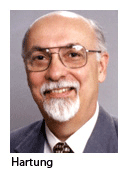With Dr. Bruce Hartung
Previous columns that focused on our church workers’ “spiritual burnout” (as one reader termed it) and the desire to provide better resources and responses  to burnout have brought about responses, primarily from congregation leaders, that offer a very different set of concerns.
to burnout have brought about responses, primarily from congregation leaders, that offer a very different set of concerns.
While these leaders definitely want to be supportive of their church workers and actively engaged in what I have previously suggested as developing a “culture of appreciation,” some of them offer a reminder that such appreciation goes in two or more directions.
Following are portions of three such responses to previous columns, each of which I denote with the letter “R” and sequential numbering. There has been some editing of the responses to help ensure a level of anonymity, even though all the responders identified themselves.
R1: “Although I can relate to pastors having burnout, our congregation has a situation that involves part-time pastors.” (The reader then illustrates this point with several instances of the pastor or previous pastor being either barely on time or late for church services, and being late for appointments and other congregational events on a regular basis.)
“I know … pastors are self-employed, and therefore we cannot direct their activities, but it is frustrating to our members to work all week, go to church meetings and activities, and always be on time. We are all busy [as well], and experience life ‘pressure points’ at work daily and with the church.”
R2: “You rightly encourage us to develop a ‘culture of appreciation.’ Appreciation goes both ways. Our pastor wants people to volunteer, and some of us do our best. But we never hear … ‘thank you.’ It is more like it is expected of us. A little appreciation goes a long way.”
R3: “We know pastors need time to study. Our pastor is on his computer and in his office for the better part of a day, several days a week. He is not out making calls on a regular basis and he is not out in our town meeting people. Some of us wonder how hard he is actually working and not a few of us wonder what he is doing on his computer. Because of this, we cannot get a lot of support for having a ‘Pastor Appreciation Sunday.’ “
These are important voices to hear. Openness to feedback and rejoicing in it without necessarily getting defensive is also important. So, my fellow clergy and other church workers, let’s begin (or continue) this important process of dialogue.
We begin this process by asking for and receiving feedback. Feedback can occur in many forms.
For example, a small group meets with the pastor a day or so after a sermon he has delivered and offers responses to the sermon; or, the pastor takes time for mutual evaluation and accountability with the Board of Elders; or, he communicates a general attitude of willingness to hear feedback from parishioners and actually asks directly for it. What is cultivated is openness to hearing what others are thinking. This does not necessarily mean that we change who we are on the basis of the feedback. But it does mean that we want feedback, that we will use it to grow, and that we may need to change some things.
That gets us to the question of personal change.
For instance, if a pastor is consistently late for meetings and/or not on time for church, I think this can communicate a lack of respect for others. Perpetual lateness does need to change. If a pastor is mired in his office and is not out in his community, that behavior is certainly worth examining and should likely change. If a pastor does not use “thank you” liberally nor offer thanksgiving for the talents and work of laypeople in the community of the baptized, then some change in that habit is in order.
I think that pastors should welcome such feedback and be open to changing for the better.
All this is built on the capacity of the community of believers (members of the body of Christ) to have frank, open, and mutual conversations with each other in prayerful and positive ways, even if the conversations are difficult.
I invite feedback from readers concerning this column.
Rev. Bruce M. Hartung, Ph.D., is the dean of Ministerial Formation at Concordia Seminary, St. Louis. He can be reached at hartungb@csl.edu.
Posted Oct. 30, 2009



